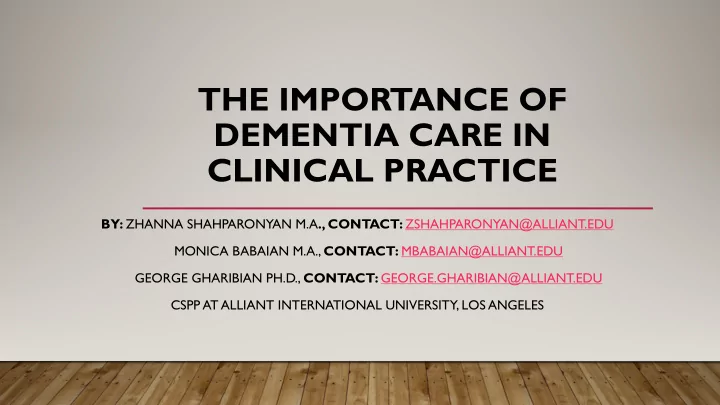

THE IMPORTANCE OF DEMENTIA CARE IN CLINICAL PRACTICE BY: ZHANNA SHAHPARONYAN M.A ., CONTACT: ZSHAHPARONYAN@ALLIANT.EDU MONICA BABAIAN M.A., CONTACT: MBABAIAN@ALLIANT.EDU GEORGE GHARIBIAN PH.D., CONTACT: GEORGE.GHARIBIAN@ALLIANT.EDU CSPP AT ALLIANT INTERNATIONAL UNIVERSITY, LOS ANGELES
ABSTRACT The quality of life and care for persons with dementia isn’t always optimal within the healthcare system and can be challenging for caregivers and healthcare providers. Patients with dementia suffer from memory loss and cognitive impairment, disabling them from making decisions. Often, decisions and treatment plans that are made by the caregivers are not originated from the patient’s own will, creating turmoil throughout the care. Person-centered care for dementia focuses on creating a more positive environment for the patient and the caregivers by valuing patient’s needs. This poster will discuss how person-centered dementia care should be implemented into clinical practice.
WHAT IS DEMENTIA? “A syndrome due to disease of the brain, usually of a chronic or progressive nature, in which there is disturbance of multiple higher cortical functions, including memory, thinking, orientation, comprehension, calculation, learning capability, language, and judgement. Consciousness is not impaired. Impairments of cognitive function are commonly accompanied, occasionally preceded, by deterioration in emotional control, social behaviour, or motivation.”
TYPES OF DEMENTIA • Mild Cognitive Impairment • Dementia with Alzheimer’s disease • Vascular Dementia • Dementia with Lewy Bodies • Frontotemporal Dementia • Mixed Dementia • Early Onset Dementia • Creutzfeldt-Jakob disease
A 2019 WORLD ALZHEIMER REPORT SURVEY FINDINGS:
WHAT IS PERSON-CENTERED DEMENTIA CARE ? • A “new culture” of dementia care that includes a more humane and holistic approach focusing on the person’s perspective and experience (Kitwood, 1997). • The goal for this approach is to empower the patient to utilize choice, abilities, express feelings, maintain existing and develop new relationships (Kitwood, 1997). • Underlines the importance of “personhood” and life story work through interaction based on one’s unique life story. • Brooker and Latham (2015) described this concept as individualized care, consisting of four main elements: • Valuing patients with dementia and those who care for them. • Treating people as individuals. • Looking at the world from the perspective of the patient with dementia. • Providing a positive social environment for a patient’s relative well-being.
WHY IS THIS IMPORTANT? • According to the 2015 World Alzheimer Report, about 47 million people worldwide were living with a type of dementia and the number is bound to increase throughout the years (Prince et al., 2015). • A meta-analysis study showed that person-centered dementia care reduced neuropsychiatric symptoms, agitation and depression and improved quality of life for patients in long-term care facilities (Kim & Park, 2017). • Improve patient care and quality of life and satisfaction of patients at in-patient facilities, group homes and hospital settings. • Provide education and proper training to caregivers, family members, and healthcare providers.
FUTURE DIRECTION • Person-centered techniques and life story work should be embedded into the care plan when treating patients with dementia (Cooney & O’Shea, 2019). Standardizing the style of treatment in in-patient • facilities, group homes and hospital settings. • Measuring outcome of the person-centered care on: Progression of dementia • Life quality and satisfaction in patients • • Patient cooperation with medical professionals and staff • Relationship maintenance with family members and or caregivers
REFERENCES • Alzheimer’s Disease International. 2019. World Alzheimer Report 2019: Attitudes to dementia. London: Alzheimer’s Disease International. • Brooker, D., & Latham, I. (2015). Person-centered dementia care: Making services better with the VIPS framework. London, England: Jessica Kingsley Publishers. • Cooney, A., & O’Shea, E. (2019). The impact of life story work on person-centred care for people with dementia living in long-stay care settings in Ireland. Dementia , 18 (7-8), 2731-2746. • Kim, S. K., & Park, M. (2017). Effectiveness of person-centered care on people with dementia: a systematic review and meta-analysis. Clinical interventions in aging , 12 , 381–397. https://doi.org/10.2147/CIA.S117637 • Kitwood, T. (1997). Dementia reconsidered: The person comes first. Philadelphia, PA: Open University Press.
• Livingston, G., Sommerlad, A., Orgeta, V., Costafreda, S. G., Huntley, J., Ames, D., Ballard, C., Banerjee, S., Burns, A., Cohen-Mansfield, J., Cooper, C., Fox, N., Gitlin, L. N., Howard, R., Kales, H.C., Larson, E., Ritchie, K., Rockwood, K., Sampson, E. L., ... & Mukadam., N. (2017). Dementia prevention, intervention, and care. The Lancet , 390 (10113), 2673-2734. • National Collaborating Centre for Mental Health (UK. (2007). Dementia. In Dementia: A NICE-SCIE Guideline on Supporting People With Dementia and Their Carers in Health and Social Care . British Psychological Society. • Prince, M., Wimo, A., Guerchet, M., Ali, G.-M., Wu, Y.-T., & Prina, M. (2015). World Alzheimer Report 2015: the global impact of dementia: an analysis of prevalence, incidence, cost and trends . Alzheimer's Disease International. • Scerri, A., Innes, A., & Scerri, C. (2019). Using appreciative inquiry to implement person-centred dementia care in hospital wards. Dementia , 18 (1), 190-209. • World Health Organization. (1992). The ICD-10 classification of mental and behavioural disorders: Clinical descriptions and diagnostic guidelines . Geneva: World Health Organization.
Recommend
More recommend